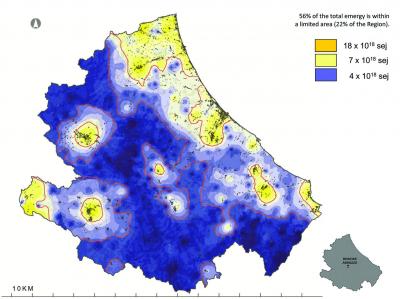
The research activities of the Ecodynamics Group (www.ecodynamics.unisi.it) span the disciplinary areas of physical chemistry, environmental chemistry and cultural heritage with the aim of defining, on a scientific basis, general criteria for sustainable and lasting development and adopting increasingly accurate tools for understanding real physical processes and systems. This research operates on two levels:
- Formalization of the epistemological basis of sustainable development: empirical observations, in the field of oscillating chemical reactions and complex systems, allow the identification of general behaviors of open systems, dissipative structures and living systems. The purpose is to deepen our understanding of natural and anthropogenic systems and to investigate the formation of internal processes of self-organization based on the relationships between constituent elements and exchanges with the external environment.
- Elaboration of environmental modeling applied to real physical systems: techniques for the study and representation of systems through patterns of relationships (energy systems theory) and methodologies of environmental monitoring and accounting are used for the calculation of indicators and synthetic information processing with applications to transformation processes, ecosystems, spatial and economic systems, urban systems and cultural heritage.
The work of the Ecodynamics Group includes the testing of methodologies for environmental sustainability assessment and the development of synthetic indicators on a thermodynamic basis. Specific expertise in the area of environmental accounting techniques and for monitoring social dynamics are complementary to the procedures of environmental certification, ISO 14000 series and Emas. Survey methodologies developed by researchers in the ecodynamics group are:
- GhG - greenhouse gas inventory and emission certification ISO 14064: a method of accounting for greenhouse gas emissions detected in a territory for various sectors of activity and surveying the absorption capacity by local ecosystems. The methodology is associated with the procedures for certifying the status of greenhouse gas emissions according to the ISO 14064 standard.
- EE - eMergetic assessment: thermodynamically based environmental accounting method (devised by H.T. Odum of the University of Florida). It measures the intensity of environmental resource use by a population relative to the specific characteristics of the settlement pattern present in the area (population, size, activities, consumption, production, land use).
- EF - Ecological Footprint: a method of accounting (devised by W.E. Rees and M. Wackernagel - Ecological Footprint Network, Oackland, CA) that expresses the anthropogenic pressure of a population on a territory in terms of the amount of biologically productive land area required to regenerate all consumed resources and absorb emissions; the total area of aquatic and terrestrial ecosystems surveyed in a territory is called Biocapacity. By comparing Ecological Footprint and Biocapacity, the ecological deficit or surplus of a region can be calculated. The study of specific activity sectors or transformation processes includes tourism, agroforestry, water and waste management, and manufacturing activities. The Ecological Footprint Forum was held in Siena in 2006 (Siena and Colle di Val d'Elsa, June 14-17) and 2010 (Siena and Colle di Val d'Elsa, June 7-11).
- ISEW - Index of Sustainable Economic Welfare: an economic-environmental accounting method that measures wealth in the local area in a complementary way to GDP and traditional economic accounting systems, estimating economic, social and environmental elements and their impact, starting with private consumption, on citizens' welfare conditions. The calculation of this index at the regional level is a peculiarity of the Ecodynamics Group.
- LCA - Life Cycle Assessment (LCA): an analytical method of assessing the potential environmental impacts (e.g. global warming, acidification, eutrophication etc.) associated with a production process (industrial, artisanal, agribusiness etc.). It allows an environmental profile of a good produced through a series of transformation processes to be outlined by estimating the potential environmental effects due to emissions (solid, liquid and/or gaseous) attributed to the various processes throughout the production chain "from cradle to grave," i.e., from raw material sampling to product disposal.
- ESV - Evaluation of Ecosystem Services - The goods (such as the provision of food and materials) and services (such as waste assimilation or climate regulation) of ecosystems represent the benefits that humans derive, directly or indirectly, from ecosystem functions, the value of which can be calculated by means of economic-environmental tools. The value of ecosystem services can be used to assess the real importance of the environment to human activity. The Ecodynamics Group is a member of the Ecosystem Services Partnership.
- BZ - oscillating chemical reactions: development of biomimetic reactors (lipid bilayers, micelles, etc.) coupled with BZ reactions for gathering information useful for understanding the development of early cellular forms. Oscillating Belousov-Zhabotinsky-type (BZ) chemical reactions are laboratory models capable of reproducing complex biological phenomena, such as enzymatic and metabolic cycles, morphogenesis, somitogenesis, etc., in a controlled environment.
- BTL - Biomass to Liquid - feasibility analysis for biomass utilization: wide range of physicochemical analysis applied to residual biomass (agro-forestry, organic waste, algae) to estimate the potential yield of liquid biofuel production (bioethanol, biodiesel).